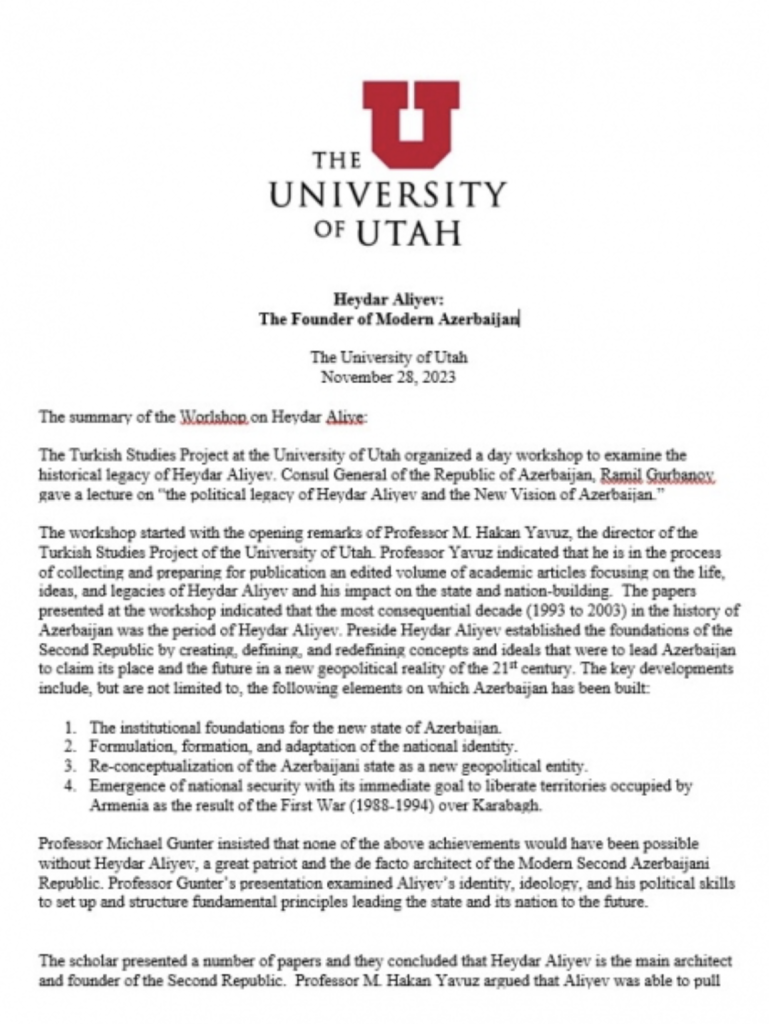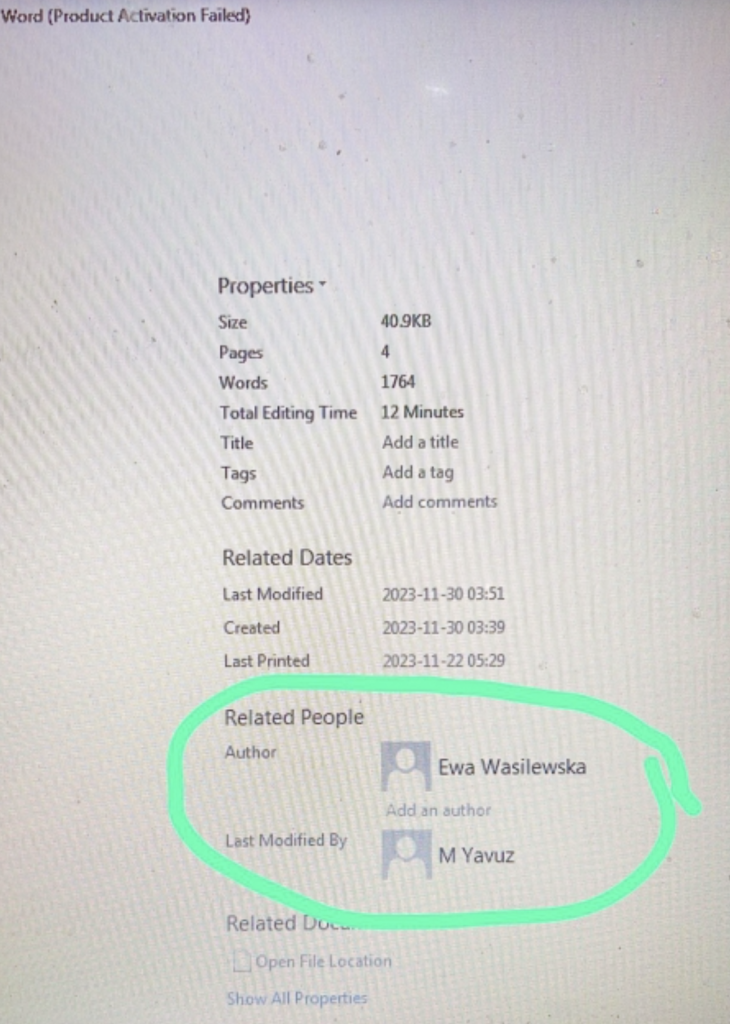By Paul Vartan Sookiasian
Given an absence of response from the University of Utah, it appears this academic institution has chosen to accept that false quotes attributed to two faculty, praising Azerbaijan’s President Ilham Aliyev and vilifying Armenians, can remain part of official University communications.
As CivilNet had reported, a press release about a University of Utah conference marking the 100th anniversary of the birth of Heydar Aliyev, Azerbaijani dictator and father of the current strongman, published by Azerbaijan’s state news source AZERTAC, included comments by the two Utah professors. The members of faculty subsequently told CivilNet they flatly deny having made the statements which praised Aliyev Sr. and were condemnatory of Armenians.
AZERTAC denied having fabricated the quotes, saying they came from the university. They provided images of a press release on University of Utah letterhead with text that matched AZERTAC’s article verbatim, and a screenshot of the file’s properties indicating the file had been created by University of Utah Associate Professor Ewa Wasilewska and last edited by Dr. Hakan Yavuz, the organizer of the workshop and director of the university’s Turkish Studies Project. Thus, according to AZERTAC’s version of the events, Utah’s Dr. Yavuz ghost wrote on the workshop for Azerbaijani state media which was then published under the name of its special correspondent Vugar Seyidov.
CivilNet reached out to the University of Utah to inquire as to why one of its professors allegedly issued false statements attributed to Utah faculty members on official letterhead for an Azerbaijani government propaganda article. An employee of the University of Utah Communications Department responded on December 20 stating they’d respond to the request for a statement “as soon as we can.” Multiple follow ups received no reply from the university.
Finally, another follow-up sent on January 23 addressed to department senior staffers did receive a reply from Communications Manager Shawn Wood, who stated, “The university will not be releasing a statement.” When questioned as to why the university initially promised a response but now refuses to do so, Wood replied that no further information would be provided. A source who is familiar with the matter has informed CivilNet that the University of Utah’s administration has advised at least one person involved not to comment. Neither Professor Yavuz nor Wasilewska responded to CivilNet’s request for comment on AZERTAC’s accusations against them.
This issue deserves serious follow-up because it is an indication of Azerbaijan’s and Turkey’s pivot away from genocide denial to a more general anti-Armenian campaigns. It also raises questions about the complicity of educational institutions and governments in this campaign, as Utah lawmakers have also developed close relations with Azerbaijani officials and repeatedly honored them at the state capitol, which was used to create positive press about Azerbaijan at a time when it was under fire for orchestrating a humanitarian crisis in Nagorno-Karabakh.
This is not the first time the University of Utah has come under fire for its activities surrounding Armenian, Turkish, and Azerbaijani issues. It has a long-running and sordid history in the realm of Armenian genocide denial since the establishment of its Turkish Studies Project by a major multi-year grant from a Turkish interest organization.
Dr. Yavuz has been its director since its establishment, who was described by the late Professor Richard Hovannisian as having “become a major figure in the trade of contemporary efforts to deny that Armenians suffered genocide.” A ‘Who’s Who’ of Armenian Genocide deniers, including Justin McCarthy, Guenter Lewy, and Stanford Shaw have had their manuscripts published by the University of Utah Press through the efforts of Dr. Yavuz, sometimes after having been rejected by many others. A number of Utah graduate advised by Yavuz have gone on to be outspoken deniers of the Armenian Genocide as well.
As academic efforts to undermine the Armenian Genocide largely floundered in recent years, especially after the President Joe Biden officially recognizing it, there has been a noticeable pivot in the output of Utah’s Turkish Studies Center towards the issues of Azerbaijan and the Nagorno-Karabakh conflict. In fact, this transition has been so pronounced, that despite the fact Dr. Yavuz’s specialization is Turkey, out of his eight publications in 2022, only one was about Turkey while the other seven concerned Nagorno-Karabakh. Yavuz’s primary collaborator in these publications has been fellow presenter at the Aliyev workshop Professor Michael Gunter of Tennessee Tech, who had his own book on Armenian Genocide denial published by Utah with the support of Yavuz prior to their sudden shift into the Karabakh conflict.
The Aliyev Workshop incident still leaves many questions yet unanswered. What is the reason behind the Turkish Studies Project and its director’s recent preoccupation with the Aliyev family and the Nagorno-Karabakh conflict? Why did quotes shown to be falsely attributed to University of Utah professors appear on the university’s official letterhead? How deep are the links between the University of Utah and the Azerbaijani state? What is the role of Turkey, Azerbaijan’s closest ally, in all this, as Yavuz and his work at Utah’s Turkish Studies Project is directly funded by Turkish sources? Why did the University of Utah go back on its decision to provide a statement to CivilNet and why is its administration advising those involved to keep silent?


The post University of Utah goes silent on controversy over its Heydar Aliyev conference appeared first on CIVILNET.